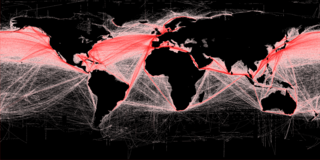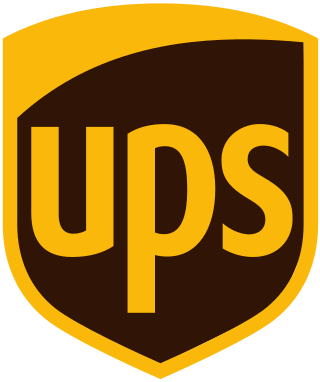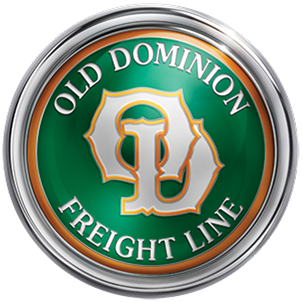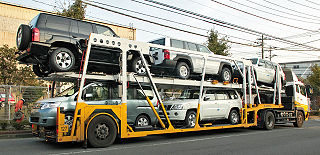
Freight transport, also referred as freight forwarding, is the physical process of transporting commodities and merchandise goods and cargo. The term shipping originally referred to transport by sea but in American English, it has been extended to refer to transport by land or air as well. "Logistics", a term borrowed from the military environment, is also used in the same sense.

United Parcel Service, Inc. (UPS) is an American multinational shipping & receiving and supply chain management company founded in 1907. Originally known as the American Messenger Company specializing in telegraphs, UPS has expanded to become a Fortune 500 company and one of the world's largest shipping couriers. UPS today is primarily known for its ground shipping services as well as the UPS Store, a retail chain which assists UPS shipments and provides tools for small businesses. UPS offers air shipping on an overnight or two-day basis and delivers to post office boxes through UPS Mail Innovations and UPS SurePost, two services that pass on packages to the United States Postal Service for last-mile delivery.
The Incoterms or International Commercial Terms are a series of pre-defined commercial terms published by the International Chamber of Commerce (ICC) relating to international commercial law. Incoterms define the responsibilities of exporters and importers in the arrangement of shipments and the transfer of liability involved at various stages of the transaction. They are widely used in international commercial transactions or procurement processes and their use is encouraged by trade councils, courts and international lawyers. A series of three-letter trade terms related to common contractual sales practices, the Incoterms rules are intended primarily to clearly communicate the tasks, costs, and risks associated with the global or international transportation and delivery of goods. Incoterms inform sales contracts defining respective obligations, costs, and risks involved in the delivery of goods from the seller to the buyer, but they do not themselves conclude a contract, determine the price payable, currency or credit terms, govern contract law or define where title to goods transfers.

Intermodal freight transport involves the transportation of freight in an intermodal container or vehicle, using multiple modes of transportation, without any handling of the freight itself when changing modes. The method reduces cargo handling, and so improves security, reduces damage and loss, and allows freight to be transported faster. Reduced costs over road trucking is the key benefit for inter-continental use. This may be offset by reduced timings for road transport over shorter distances.

In transportation, freight refers to goods conveyed by land, water or air, while cargo refers specifically to freight when conveyed via water or air. In economics, freight refers to goods transported at a freight rate for commercial gain. The term cargo is also used in case of goods in the cold-chain, because the perishable inventory is always in transit towards a final end-use, even when it is held in cold storage or other similar climate-controlled facilities, including warehouses.

FOB is a term in international commercial law specifying at what point respective obligations, costs, and risk involved in the delivery of goods shift from the seller to the buyer under the Incoterms standard published by the International Chamber of Commerce. FOB is only used in non-containerized sea freight or inland waterway transport. As with all Incoterms, FOB does not define the point at which ownership of the goods is transferred.

Rail freight transport is the use of railways and trains to transport cargo as opposed to human passengers.
Truckload shipping is the movement of large amounts of homogeneous cargo, generally the amount necessary to fill an entire semi-trailer or intermodal container. A truckload carrier is a trucking company that generally contracts an entire trailer-load to a single customer. This is as opposed to a less-than truckload (LTL) company that generally mixes freight from several customers in each trailer. One advantage Full Truckload (FTL) carriers have over Less than Truckload carriers is that the freight is never handled en route, whereas an LTL shipment will typically be transported on several different trailers. Truckload shipments are typically run on 48' or 53'dry van trailers which will hold 24 or 26 pallets respectively.

A freight rate is a price at which a certain cargo is delivered from one point to another. The price depends on the form of the cargo, the mode of transport, the weight of the cargo, and the distance to the delivery destination. Many shipping services, especially air carriers, use dimensional weight for calculating the price, which takes into account both weight and volume of the cargo.

Less-than-truckload shipping or less than load (LTL) is the transportation of an amount of freight sized between individual parcels and full truckloads. Parcel carriers handle small packages and freight that can be broken down into units less than approximately 150 pounds (68 kg). Full truckload carriers move entire semi-trailers. Semi-trailers are typically between 26 and 53 feet and require a substantial amount of freight to make such transportation economical. The term LTL can refer to the freight itself, or to the carrier that transports the such freight.
A freight forwarder or forwarding agent is a person or a company who co-ordinates and organizes the movement of shipments on behalf of a shipper by liaising with carriers. The carriers may use a variety of shipping modes, including ships, airplanes, trucks, and railroads, and often use multiple modes for a single shipment. A freight forwarder does not move the goods but acts as an agent in the logistics network and will carry out freight consolidation, rate negotiations, shipment tracking, customs and other documentation, among other tasks. FIATA describes a freight forwarder as the "Architect of transport".

Freight companies are companies that specialize in the moving of freight, or cargo, from one place to another. These companies are divided into several variant sections. For example, international freight forwarders ship goods internationally from country to country, and domestic freight forwarders, ship goods within a single country.
An air waybill (AWB) or air consignment note is a receipt issued by an international airline for goods and an evidence of the contract of carriage. It is not a document of title to the goods. The air waybill is non-negotiable.

TForce Freight, a subsidiary of TFI International, is an American less than truckload (LTL) freight carrier based in Richmond, Virginia. The company was founded in 1935 as Overnite Transportation, the name it used until 2006 when it was rebranded UPS Freight by new owner UPS. Its name changed to TForce Freight in 2021 when UPS sold the company to TFI.
A specialized set of jargon describe the tools, equipment, and employment sectors used in the trucking industry in the United States. Some terms may be used within other English-speaking countries, or within the freight industry in general. For example, shore power is a term borrowed from shipping terminology, in which electrical power is transferred from shore to ship, instead of the ship relying upon idling its engines. Drawing power from land lines is more efficient than engine idling and eliminates localized air pollution. Another borrowed term is "landing gear", which refers to the legs which support the front end of a semi-trailer when it is not connected to a semi-truck. Some nicknames are obvious wordplay, such as "portable parking lot", in reference to a truck that carries automobiles.

Saia is an American less than truckload (LTL) trucking company, that originated in Houma, Louisiana in 1924. With original operation occurring in Louisiana and Texas for the first fifty years, expansion came after 1980 when coverage began reaching into more states within the South. Further expansion happened through mergers with other companies, which allowed Saia to provide service for thirty six states. Saia ranks within the top ten of LTL carriers in the United States, with revenues of over $1.8 billion in 2020.
Pitt Ohio Express, LLC, stylized PITT OHIO, is a privately owned transportation and supply chain management company based in Pittsburgh, Pennsylvania that serves the Mid-Atlantic and Midwestern US. Pitt Ohio ranked 48th on Transport Topics Top 100 For-Hire list and 14th on its Top Less-Than-Truckload (LTL) Carriers list of US and Canadian freight carriers by revenue for 2021.

Old Dominion Freight Line, Inc. (ODFL) is an American regional, inter-regional and national less than truckload shipping (LTL) company. In addition to its core LTL services, the company offers expedited, logistics and household moving services.

An auto transport broker is a type of cargo broker that specializes in the shipping and transportation of vehicles. Most vehicles shipped in the U.S. are cars and trucks, but many brokers handle boats, RVs, motorcycles and other types of vehicles as well. Auto transport is classified as "specialized freight trucking" under NAICS code 484230.
The freight technology sector, also known as FreightTech, refers to software companies and technologies which assist in supply chain management and the movement of freight. In the five years following 2014, investment in FreightTech companies grew from $118 million to $3 billion per year.











